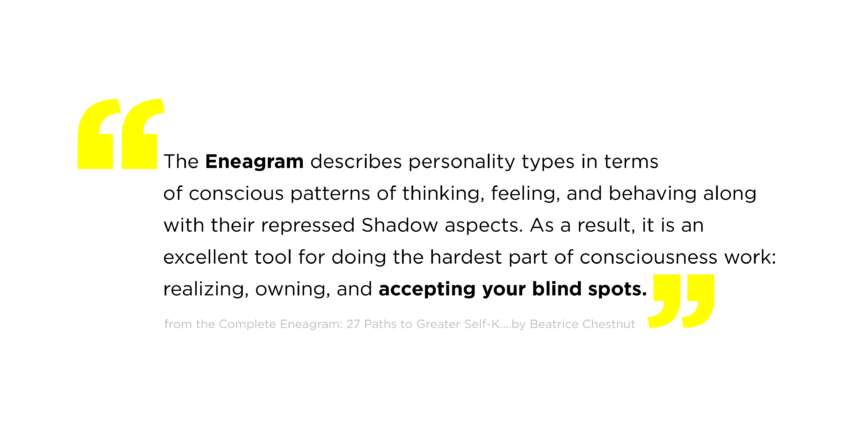In the isolation of COVID-19, there was a short hiatus in work and the eventual reprise for self-discovery. Suddenly, people had nowhere to go but home, isolated with family, forced to get along with people they lived with. In this deep isolation there came about multiple discoveries on self-development and aneed for relationship building.
Enter the Enneagram.
The Enneagram is a unique system that classifies people into 9 different personality types and different subtypes subsequently. It was first introduced to the world by George Gurdjieff in 1915 and further developed by Oscar Ichazo in the 1960s. The personalities are charted in an enneagon shape, therefore calling it The Enneagram.
Unlike most personality assessment tools the Enneagram seeks to not only to define your personality, but your key motivators, your fears and how you behave.

Many companies utilize the Myerrs-Briggs 16-personality type model to understand the persona of a team member. However, this tool never gets past labelling someone as an INTJ or ENFP. Very rarely is it dynamic enough to determine needs assessment, determine motivations, and piece together blind spots.
The Enneagram offers a clear perspective on the following questions:

What is my personality type?

What motivates me?

What do I fear then most?

What enneagram type do I get along with the most?

How do I behave when I am stressed?

How do I behave when I am experiencing growth?

What are my instinctive behaviors and needs?

How do I behave in general?

What is my leadership style?

How do I behave in general?
Interesting, isn’t it? When I first came across the enneagram, I felt like I discovered a gold mine in managing people better. Mastering the enneagram is easy if you are willing to put in the time of studying books into it and practicing it by observing teammates. Luckily for you, we have made a quick summary of the 9 types and what it means for you at work.
According to the Enneagram Institute, the 9 types can be explained as such:

ENNEAGRAM TYPE 1: THE REFORMER
The Rational, Idealistic Type: Principled, Purposeful, Self-Controlled, and Perfectionistic Ones are conscientious and ethical, with a strong sense of right and wrong. They are teachers, crusaders, and advocates for change: always striving to improve things, but afraid of making a mistake. Well-organized, orderly, and fastidious, they try to maintain high standards, but can slip into being critical and perfectionistic. They typically have problems with resentment and
impatience. At their Best: wise, discerning, realistic, and noble. Can be morally heroic.

At their Best: unselfish and altruistic, they have unconditional love for others.

Basic Fear: Of being corrupt/evil, defective

Basic Desire: To be good, to have integrity, to be balanced

Key Motivations: Want to be right, to strive higher and improve everything, to be consistent with their ideals, to justify themselves, to be beyond criticism so as not to be condemned by anyone.

ENNEAGRAM TYPE 2: THE HELPER
The Caring, Interpersonal Type: Demonstrative, Generous, People-Pleasing, and Possessive Twos are empathetic, sincere, and warm-hearted. They are friendly, generous, and self-sacrificing, but can also be sentimental, flattering, and people-pleasing. They are well-meaning and driven to be close to others, but can slip into doing things for others in order to be needed. They typically have problems with possessiveness and with acknowledging their own needs. At their Best: unselfish and altruistic, they have unconditional love for others.

At their Best: unselfish and altruistic, they have unconditional love for others.

Basic Fear: Of being unwanted, unworthy of being loved

Basic Desire: To feel loved

Key Motivations: Want to be loved, to express their feelings for others, to be needed and appreciated, to get others to respond to them, to vindicate their claims about themselves.

ENNEAGRAM TYPE 3: THE MOTIVATOR
The Success-Oriented, Pragmatic Type: Adaptable, Excelling, Driven, and Image-Conscious Threes are self-assured, attractive, and charming. Ambitious, competent, and energetic, they can also be status-conscious and highly driven for advancement. They are diplomatic and
poised but can also be overly concerned with their image and what others think of them. They typically have problems with workaholism and competitiveness. At their Best: self-accepting, authentic, everything they seem to be—role models who inspire others.

At their Best: self-accepting, authentic, everything they seem to be-role models who inspire others.

Basic Fear: Of being worthless

Basic Desire: To feel valuable and worthwhile

Key Motivations: Want to be affirmed, to distinguish themselves from others, to have
attention, to be admired, and to impress others.

ENNEAGRAM TYPE 4: THE ARTIST
The Sensitive, Withdrawn Type: Expressive, Dramatic, Self-Absorbed, and Temperamental Fours are self-aware, sensitive, and reserved. They are emotionally honest, creative, and personal, but can also be moody and self-conscious. Withholding themselves from others due to feeling vulnerable and defective, they can also feel disdainful and exempt from ordinary ways of living. They typically have problems with melancholy, self-indulgence, and self-pity. At their Best: inspired and highly creative, they are able to renew themselves and transform their experiences.

At their Best: inspired and highly creative they are able to renew themselves and transform their experiences.

Basic Fear: That they have no identity or personal significance

Basic Desire: To find themselves and their significance (to create an identity)

Key Motivations: Want to express themselves and their individuality, to create and surround themselves with beauty, to maintain certain moods and feelings, to withdraw to protect their self-image, to take care of emotional needs before attending to anything else, to attract a “rescuer.”

ENNEAGRAM TYPE 5: THE THINKER
The Intense, Cerebral Type: Perceptive, Innovative, Secretive, and Isolated Fives are alert, insightful, and curious. They are able to concentrate and focus on developing complex ideas and skills. Independent, innovative, and inventive, they can also become preoccupied with their thoughts and imaginary constructs. They become detached, yet high-strung and intense. They typically have problems with eccentricity, nihilism, and isolation. At their Best: visionary pioneers, often ahead of their time, and able to see the world in an entirely new way.

At their Best: visionary pioneers, often ahead of time, and able to see the world in an entirely new way.

Basic Fear: Being useless, helpless, or incapable

Basic Desire: To be capable and competent

Key Motivations: Want to possess knowledge, to understand the environment, to have everything figured out as a way of defending the self from threats from the environment.

ENNEAGRAM TYPE 6: THE LOYALIST
The Committed, Security-Oriented Type: Engaging, Responsible, Anxious, and Suspicious The committed, security-oriented type. Sixes are reliable, hard-working, responsible, and trustworthy. Excellent “troubleshooters,” they foresee problems and foster cooperation, but can also become defensive, evasive, and anxious—running on stress while complaining about it. They can be cautious and indecisive, but also reactive, defiant and rebellious. They typically have problems with self-doubt and suspicion. At their Best: internally stable and self-reliant, courageously championing themselves and others.

At their Best: internally stable and self-reliant courageously championing themselves and others.

Basic Fear: Of being without support and guidance

Basic Desire: To have security and support

Key Motivations: Want to have security, to feel supported by others, to have certitude and reassurance, to test the attitudes of others toward them, to fight against anxiety and insecurity.

ENNEAGRAM TYPE 7: THE GENERALIST
The Busy, Fun-Loving Type: Spontaneous, Versatile, Distractible, and Scattered Sevens are
extroverted, optimistic, versatile, and spontaneous. Playful, high-spirited, and practical, they can also misapply their many talents, becoming over-extended, scattered, and undisciplined. They constantly seek new and exciting experiences but can become distracted and exhausted by staying on the go. They typically have problems with impatience and impulsiveness. At their Best: they focus their talents on worthwhile goals, becoming appreciative, joyous, and satisfied.

At their Best: they focus their talents on worthwhile goals, becoming appreciative, joyous, and satisfied.

Basic Fear: Of being deprived and in pain

Basic Desire: To be satisfied and content—to have their needs fulfilled

Key Motivations: Want to maintain their freedom and happiness, to avoid missing out on worthwhile experiences, to keep themselves excited and occupied, to avoid and discharge pain.

ENNEAGRAM TYPE 8: THE LEADER
The Powerful, Dominating Type: Self-Confident, Decisive, Willful, and Confrontational Eights are self-confident, strong, and assertive. Protective, resourceful, straight-talking, and decisive, but can also be ego-centric and domineering. Eights feel they must control their environment, especially people, sometimes becoming confrontational and intimidating. Eights typically have problems with their tempers and with allowing themselves to be vulnerable. At their Best: self- mastering, they use their strength to improve others’ lives, becoming heroic, magnanimous, and inspiring.

At their Best: self-mastering, they use their strength to improve others’ lives, becoming heroic, magnanimous, and inspiring.

Basic Fear: Of being harmed or controlled by others

Basic Desire: To protect themselves (to be in control of their own life and destiny)

Key Motivations: Want to be self-reliant, to prove their strength and resist weakness, to be important in their world, to dominate the environment, and to stay in control of their situation.

ENNEAGRAM TYPE 9: PEACEMAKER
The Easygoing, Self-Effacing Type: Receptive, Reassuring, Agreeable, and Complacent Nines are accepting, trusting, and stable. They are usually creative, optimistic, and supportive, but can also be too willing to go along with others to keep the peace. They want everything to go smoothly and be without conflict, but they can also tend to be complacent, simplifying problems and minimizing anything upsetting. They typically have problems with inertia and stubbornness. At their Best: indomitable and all-embracing, they can bring people together and heal conflicts.

At their Best: indomitable and all-embracing, they can bring people together and heal conflicts.

Basic Fear: Of loss and separation

Basic Desire: To have inner stability “peace of mind”

Key Motivations: Want to create harmony in their environment, to avoid conflicts and tension, to preserve things as they are, to resist whatever would upset or disturb them.
How do you find out your type?
There are multiple tests online, you can take the official RHETI 0.2 exam for a fee, take free tests online or simply read books on the enneagram and discover your type yourself.
The Enneagram is a tool that helps us understand our uniqueness and the motivations of others. This February, Rocket Station sheds light into developing and nurturing relationships. The Enneagram, when mastered and learned well can aid anyone in understanding their needs and that of those around them. Learn more about interesting topics that can help you connect to yourself and the world around you by joining our Newsletter.
RELATED STORIES



SHARE
POST A COMMENT


